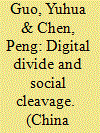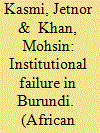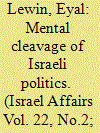|
|
|
Sort Order |
|
|
|
Items / Page
|
|
|
|
|
|
|
| Srl | Item |
| 1 |
ID:
107292


|
|
|
|
|
| Publication |
2011.
|
| Summary/Abstract |
During its structural transformation, rural China witnessed the emergence of four types of village: traditional, industrialized, commercial and villages in cities. Information Communication Technologies (ICTs), including fixed phones, cell phones, television sets and the internet (with personal computers), are now commonly used in Chinese villages but in ways that differentiate villagers according to variables such as occupation, villager membership and social status. The adoption of ICTs by peasants not only represents but also accelerates growing peasant differentiation; in other words, the function of ICTs could not penetrate the barrier of social structure. Meanwhile, structural transformation in China has been an activator to shaping peasants' diversified ideas about information, and the demand for and usage of ICTs. An analysis of peasants' ICT adoption thus enables us to identify the basic trends and characteristics of social transformation in contemporary China.
|
|
|
|
|
|
|
|
|
|
|
|
|
|
|
|
| 2 |
ID:
182431


|
|
|
|
|
| Summary/Abstract |
Ethnic and land conflicts have recently gained significance in peace and conflict resolution. It is imperative to understand both endogenous and exogenous factors and their relations towards the institutional, democratic, and state-building process to mediate the risks of class and land conflicts. This paper attempts to identify historical relations of land and class structure by analysing Burundi land and class conflict and its significance for peace and stability. We found that the imbalance of land ownership and class structure in a society leads to armed conflicts, leading to an outbreak of other social conflicts, including violence, forced displacement, paralyzed land governance, and power relations changes. Hence, there is a dire need to foster reintegration and reconciliation through balanced multiple diplomacies in Burundi, enhancing state legitimacy towards sustainable land tenure security, improving state capacity, and ensuring justice in the reconciliation process, in association with local and regional powers.
|
|
|
|
|
|
|
|
|
|
|
|
|
|
|
|
| 3 |
ID:
144674


|
|
|
|
|
| Summary/Abstract |
In societies marked by numerous diversities, like the Jewish-Israeli one, understanding social cleavages might show a larger picture of the group and form a broader comprehension of its characteristics. Most studies concentrate on somewhat conventional cleavages, such as the socioeconomic cleavage, the ethnic cleavage, the religious or the political one; this article, by contrast, suggests a different point of view for the mapping of social cleavages within Israeli society. It claims that the Jewish population in Israel is split into two competing groups: stakeholders versus deprived. These categories of social identity are psychological states of mind in which no matter how the national resources are distributed, the stakeholders will always act as superiors, even if they are in inferior positions, while the deprived will always take the role of eternal underdog even if all of the major political ranks come under their control. This article brings about a review of over a century of ideological debates within the Zionist movement; it reveals how understanding the logic of the Israeli political discourse as a competition between the two newly defined social groups enables a better comprehension of the inherent tension between them.
|
|
|
|
|
|
|
|
|
|
|
|
|
|
|
|
|
|
|
|
|